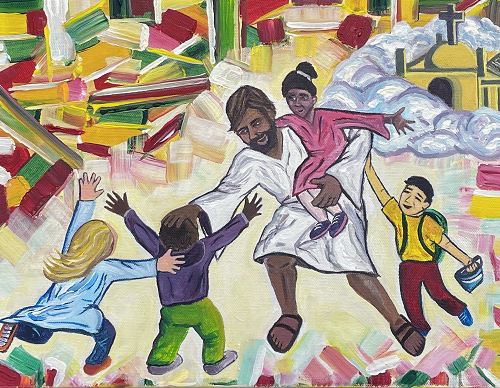
Become Like Children
Commissioned art piece titled “Let The Little Children Come To Me.” © Trevor Anzai 2025.
Accompanied poem in audio format
Four minute read
I taught a challenging art class. The group of children varied in skill, and some kids struggle with behavioural issues. One particular child was hard to teach. They did not show respect and would not listen. I tried to be patient and gentle with them.
Later in the curriculum, I was tasked with teaching either an anime or landscape project. I was reluctant to teach anime. It’s not my style and the workshop required extra preparation. However, I chose the anime lesson for the child with behavioural issues. They often talked about their anime comic books. They even showed their latest copies with great excitement. So, I took an opportunity to delight in them. And of course, it was their favourite class! They became more interested and they showed greater respect for the remaining workshops. They were also the only ones who wrote me a thank you card at the end of the year. It was a reminder that the most challenging children can change.
I developed a great love for children through my teaching experience. Their inherently good nature makes me smile. They love to volunteer themselves whether it’s distributing painting supplies or sharpening dull pencils. They are like little flowers that thirst for the waters of affirmation. They love it when we delight in them. They are also brutally honest. Sometimes, you can’t help but laugh at their reactions. They have their moments, but they usually respond well to correction and discipline. If they don’t, they eventually behave appropriately. They also are like little sacraments, visible signs of an invisible reality. They reveal the freedom, joy, and excitement we are called to live as adults. They love to learn, they love to play, and they run around having lots of fun. They mysteriously show God’s love.
The Catholic tradition teaches that children are the supreme gift of marriage (Catechism of the Catholic Church, paragraph 1652). Not just any gift, but the supreme gift. And I think this holds true regardless if we are married, working with children, or playing with our nephews and nieces. How are they gifts? Three reflections came to mind.
Children challenge us.
They give us an opportunity to exemplify unconditional love, sacrificial responsibility, and tender gentleness. They help us grow in virtue and sanctification. The most vulnerable are placed into our arms for loving care. Several years ago, one of my friends became a new dad. His life changed significantly. He said, “My son has no one to take care of him but my wife and I.” The great responsibility as a parent ushered tremendous opportunities for personal growth. He sacrificed sleep to take care of his newborn, he worked hard at his job to provide for his family, and he committed more personal time to his wife and son.
Children inspire the creative genius within us.
Robert Henri wrote, “The real study of an art student is more a development of that sensitive nature and appreciative imagination with which he was so fully endowed when a child, and which, unfortunately in almost all cases, the contact with the grown-ups shames out of him before he has passed into what is understood as real life” (The Art Spirit, page 58). The children I have taught have become my very own teachers. They inspire my inner child—playing, creating, making mistakes, and learning again and again. When I teach art, the children take my instructions and then run with it. They make the art lesson their own, adding their favourite little details and their own colours. Their creative imaginations are amazing. They inspire me. I now lean heavily on my own imagination when I make artwork.
Children teach us profound spiritual truths.
Jesus said, “Truly I tell you, unless you change and become like children, you will never enter the kingdom of heaven” (Matthew 18:3). As usual, Jesus said something very unexpected. But being childlike does not mean childish. Rather, it means changing our prideful, controlling, and fearful tendencies into a trusting and dependent disposition towards the Good Father. He loves us and He wants what is best for us. Christ also said: “I am the vine; you are the branches. Those who abide in me and I in them bear much fruit, because apart from me you can do nothing” (John 15:5). God doesn’t need a lot from us. He uses the little we have to do extraordinary things. We will make significant progress in our spiritual lives when we rely on God and not ourselves.
Just as a child with challenging behaviours changed their ways in my art class, with God’s grace, we too can transform our hearts. It doesn’t matter where we’ve been or what we’ve done. We are all called to change, from adults to childlike, trusting not in ourselves, but trusting in God who is all good, all powerful, all merciful, and all loving.
Trevor’s newest articles will be posted on Substack starting in March 2025. An archived list will remain on this website. Details to follow.